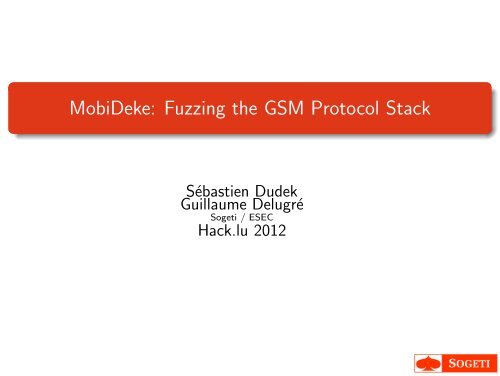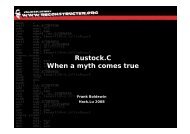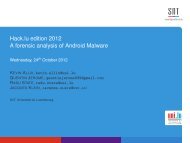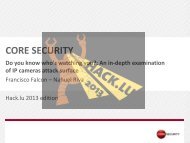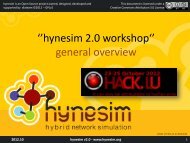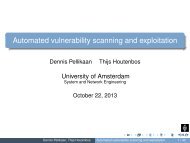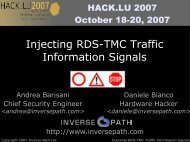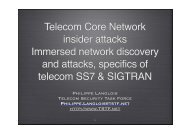MobiDeke Fuzzing the GSM Protocol Stack
MobiDeke: Fuzzing the GSM Protocol Stack
MobiDeke: Fuzzing the GSM Protocol Stack
- No tags were found...
You also want an ePaper? Increase the reach of your titles
YUMPU automatically turns print PDFs into web optimized ePapers that Google loves.
<strong>MobiDeke</strong>: <strong>Fuzzing</strong> <strong>the</strong> <strong>GSM</strong> <strong>Protocol</strong> <strong>Stack</strong>Sébastien DudekGuillaume DelugréSogeti / ESECHack.lu 2012
Introduction<strong>Fuzzing</strong> over-<strong>the</strong>-airThe <strong>MobiDeke</strong> FrameworkConclusionThe <strong>GSM</strong> (2G) network<strong>MobiDeke</strong>: <strong>Fuzzing</strong> <strong>the</strong> <strong>GSM</strong> <strong>Protocol</strong> <strong>Stack</strong> 4/38
Introduction<strong>Fuzzing</strong> over-<strong>the</strong>-airThe <strong>MobiDeke</strong> FrameworkConclusionTo reach our goal• Baseband code is proprietaryHow to find bugs?• Reverse-engineering: Hard because <strong>the</strong> code is very complex• <strong>Fuzzing</strong>: The easier way, but need some knowledge and a radio device like<strong>the</strong> USRP (we’ve won one at hack.lu;) or a nanoBTS, UmTRX, Phi card...For more information: Harald Welte’s presentation at SSTIC 2010 gives also agood overview of <strong>the</strong> <strong>GSM</strong> industry and security<strong>MobiDeke</strong>: <strong>Fuzzing</strong> <strong>the</strong> <strong>GSM</strong> <strong>Protocol</strong> <strong>Stack</strong> 8/38
Introduction<strong>Fuzzing</strong> over-<strong>the</strong>-airThe <strong>MobiDeke</strong> FrameworkConclusion<strong>Fuzzing</strong>4 very important points• Choose your target• Targeting <strong>the</strong> baseband <strong>GSM</strong> stack (2G), not 3G, HSDPA, LTE...• SMS are usually not parsed by <strong>the</strong> baseband (passed as raw PDUs to <strong>the</strong> APP)• Smartphones: HTC Desire S, Desire Z, iPhone 4S...• Inject malformed data• Monitor target activity• Classify bugs, behaviours<strong>MobiDeke</strong>: <strong>Fuzzing</strong> <strong>the</strong> <strong>GSM</strong> <strong>Protocol</strong> <strong>Stack</strong> 9/38
Introduction<strong>Fuzzing</strong> over-<strong>the</strong>-airThe <strong>MobiDeke</strong> FrameworkConclusion<strong>Fuzzing</strong>4 very important points• Choose your target• Inject malformed data• Smart generation of <strong>GSM</strong> packets (specs, existing librairies...)• Mutate each field of <strong>the</strong> generated message (describe a structure with Sulley)• Monitor target activity• Classify bugs, behaviours<strong>MobiDeke</strong>: <strong>Fuzzing</strong> <strong>the</strong> <strong>GSM</strong> <strong>Protocol</strong> <strong>Stack</strong> 9/38
Introduction<strong>Fuzzing</strong> over-<strong>the</strong>-airThe <strong>MobiDeke</strong> FrameworkConclusion<strong>Fuzzing</strong>4 very important points• Choose your target• Inject malformed data• Monitor target activity• Quite difficult because we don’t have a debugger• Check if <strong>the</strong> phone is responding• Look for strange behaviors / side-effects• ...• Classify bugs, behaviours<strong>MobiDeke</strong>: <strong>Fuzzing</strong> <strong>the</strong> <strong>GSM</strong> <strong>Protocol</strong> <strong>Stack</strong> 9/38
Introduction<strong>Fuzzing</strong> over-<strong>the</strong>-airThe <strong>MobiDeke</strong> FrameworkConclusion<strong>Fuzzing</strong>4 very important points• Choose your target• Inject malformed data• Monitor target activity• Classify bugs, behaviours• Crash reporting: report with indicators• Replay <strong>the</strong> recorded payload and see what happens<strong>MobiDeke</strong>: <strong>Fuzzing</strong> <strong>the</strong> <strong>GSM</strong> <strong>Protocol</strong> <strong>Stack</strong> 9/38
SummaryIntroduction<strong>Fuzzing</strong> over-<strong>the</strong>-airThe <strong>MobiDeke</strong> FrameworkConclusion1 Introduction2 <strong>Fuzzing</strong> over-<strong>the</strong>-air3 The <strong>MobiDeke</strong> Framework4 Conclusion<strong>MobiDeke</strong>: <strong>Fuzzing</strong> <strong>the</strong> <strong>GSM</strong> <strong>Protocol</strong> <strong>Stack</strong> 10/38
Introduction<strong>Fuzzing</strong> over-<strong>the</strong>-airThe <strong>MobiDeke</strong> FrameworkConclusion<strong>GSM</strong> layersLayers• Layer 3• Radio Ressource: Channel set up andtear-down• Mobility Management: User location...• Connection Management: Call (CC),SMS and o<strong>the</strong>r services• Layer 2• Fragmentation• Integrity check• Layer 1• Transfers data over <strong>the</strong> air interface• Uses GMSK modulation• F/TDMA for multiple accesses<strong>MobiDeke</strong>: <strong>Fuzzing</strong> <strong>the</strong> <strong>GSM</strong> <strong>Protocol</strong> <strong>Stack</strong> 11/38
L3 Messages structureIntroduction<strong>Fuzzing</strong> over-<strong>the</strong>-airThe <strong>MobiDeke</strong> FrameworkConclusionThere are 5 standards defining information elements (described in 11.1.14 in <strong>the</strong>TS 04.07)<strong>MobiDeke</strong>: <strong>Fuzzing</strong> <strong>the</strong> <strong>GSM</strong> <strong>Protocol</strong> <strong>Stack</strong> 12/38
Introduction<strong>Fuzzing</strong> over-<strong>the</strong>-airThe <strong>MobiDeke</strong> FrameworkConclusionState Machines: Originating a Call example (simplified)SETUPMS:CALL_CONFIRMEDASSIGNMENTASSIGNMENT_COMPLETCONNECTRELEASE BTS:CONNECT_ACKRELEASE SPEAKRELEASERELEASEObservations• There is often a way to exit from astate machine (e.g.: The RELEASEmessage)• Sometimes a state requires userinteraction• There are ‘obscure’ elements: presentin specs, but never seen in real life...END<strong>MobiDeke</strong>: <strong>Fuzzing</strong> <strong>the</strong> <strong>GSM</strong> <strong>Protocol</strong> <strong>Stack</strong> 13/38
Introduction<strong>Fuzzing</strong> over-<strong>the</strong>-airThe <strong>MobiDeke</strong> FrameworkConclusionMessage exchangesSome message exchanges can be considered as stateless, but <strong>the</strong>re are also finitestate machinesStateless exchanges• Simple to fuzzFinite state machines• Complex and harder to fuzz• Also harder to program correctly: potential surprises<strong>MobiDeke</strong>: <strong>Fuzzing</strong> <strong>the</strong> <strong>GSM</strong> <strong>Protocol</strong> <strong>Stack</strong> 14/38
Let’s fuzz it!Introduction<strong>Fuzzing</strong> over-<strong>the</strong>-airThe <strong>MobiDeke</strong> FrameworkConclusionWe have set up our network with OpenBTS as followsBut how to send a payload to a targeted cellphone? ⇒ Use <strong>the</strong> ‘testcall’feature<strong>MobiDeke</strong>: <strong>Fuzzing</strong> <strong>the</strong> <strong>GSM</strong> <strong>Protocol</strong> <strong>Stack</strong> 15/38
Introduction<strong>Fuzzing</strong> over-<strong>the</strong>-airThe <strong>MobiDeke</strong> FrameworkConclusionThe ‘testcall’ featureThe ‘testcall’ feature• Included in OpenBTS (since 2.5 version) and OpenBSC• Opens a channel for each targeted IMSI*• The channel ties to an UDP socket on local computer• Takes packets as Layer 3 messages and forwards <strong>the</strong>m to <strong>the</strong> mobile*IMSI: International Mobile Subscriber Identity<strong>MobiDeke</strong>: <strong>Fuzzing</strong> <strong>the</strong> <strong>GSM</strong> <strong>Protocol</strong> <strong>Stack</strong> 16/38
Introduction<strong>Fuzzing</strong> over-<strong>the</strong>-airThe <strong>MobiDeke</strong> FrameworkConclusion<strong>Fuzzing</strong> problems...Testcall exists for fuzzing handsets, but it’s not enough because• It works for a limited time• OpenBTS crashes a lot• The reserved channel is not very stable• You’re stuck to your chair while trying to send all your testcases...• What about <strong>the</strong> monitoring?<strong>MobiDeke</strong>: <strong>Fuzzing</strong> <strong>the</strong> <strong>GSM</strong> <strong>Protocol</strong> <strong>Stack</strong> 17/38
SummaryIntroduction<strong>Fuzzing</strong> over-<strong>the</strong>-airThe <strong>MobiDeke</strong> FrameworkConclusionTestcases generation and mutationMonitoringReportFuture enhancement1 Introduction2 <strong>Fuzzing</strong> over-<strong>the</strong>-air3 The <strong>MobiDeke</strong> FrameworkTestcases generation and mutationMonitoringReportFuture enhancement4 Conclusion<strong>MobiDeke</strong>: <strong>Fuzzing</strong> <strong>the</strong> <strong>GSM</strong> <strong>Protocol</strong> <strong>Stack</strong> 18/38
Introduction<strong>Fuzzing</strong> over-<strong>the</strong>-airThe <strong>MobiDeke</strong> FrameworkConclusionTestcases generation and mutationMonitoringReportFuture enhancement<strong>MobiDeke</strong>?To perform our fuzzing tests, we created a framework that:• Generates and mutates L3 messages• Sends payload ‘over-<strong>the</strong>-air’• Checks if a handset is ready to receive our payload• Monitors states (Phone and BTS)• Records a final report<strong>MobiDeke</strong>: <strong>Fuzzing</strong> <strong>the</strong> <strong>GSM</strong> <strong>Protocol</strong> <strong>Stack</strong> 19/38
Introduction<strong>Fuzzing</strong> over-<strong>the</strong>-airThe <strong>MobiDeke</strong> FrameworkConclusion<strong>MobiDeke</strong> Architecture DiagramTestcases generation and mutationMonitoringReportFuture enhancement<strong>MobiDeke</strong>: <strong>Fuzzing</strong> <strong>the</strong> <strong>GSM</strong> <strong>Protocol</strong> <strong>Stack</strong> 20/38
Introduction<strong>Fuzzing</strong> over-<strong>the</strong>-airThe <strong>MobiDeke</strong> FrameworkConclusionTestcases generation and mutationMonitoringReportFuture enhancementMethods for data generation and mutationCreating crafted L3 messages• Dumb: using captures (MBUS Nokia, OsmocomBB...) and bit-flipping• Smarter: knowing <strong>the</strong> structure of <strong>the</strong> messages• gsm um for scapy: interesting but not complete• libmich developed by Benoît Michau: we have chosen this solution for <strong>the</strong>most partMutations• ‘libmich’ Mutor• Sulley mutation engineIt is better to combine multiple generation methods to cover as much testcases aspossible.<strong>MobiDeke</strong>: <strong>Fuzzing</strong> <strong>the</strong> <strong>GSM</strong> <strong>Protocol</strong> <strong>Stack</strong> 22/38
<strong>MobiDeke</strong>: MonitoringIntroduction<strong>Fuzzing</strong> over-<strong>the</strong>-airThe <strong>MobiDeke</strong> FrameworkConclusionTestcases generation and mutationMonitoringReportFuture enhancement<strong>MobiDeke</strong>: <strong>Fuzzing</strong> <strong>the</strong> <strong>GSM</strong> <strong>Protocol</strong> <strong>Stack</strong> 23/38
Introduction<strong>Fuzzing</strong> over-<strong>the</strong>-airThe <strong>MobiDeke</strong> FrameworkConclusionTestcases generation and mutationMonitoringReportFuture enhancementMethods used to monitor crashesProblems• Blackbox monitoring• Did <strong>the</strong> baseband crash?Solutions• Check if <strong>the</strong> baseband still responds correctly to ‘AT’ commands• Look for bugs on <strong>the</strong> application processor by checking crashlogs• Check <strong>the</strong> radio channel state reserved by OpenBTS<strong>MobiDeke</strong>: <strong>Fuzzing</strong> <strong>the</strong> <strong>GSM</strong> <strong>Protocol</strong> <strong>Stack</strong> 24/38
Introduction<strong>Fuzzing</strong> over-<strong>the</strong>-airThe <strong>MobiDeke</strong> FrameworkConclusionTestcases generation and mutationMonitoringReportFuture enhancementCheck <strong>the</strong> reserved channel: ’over-<strong>the</strong>-air’Motivations• OpenBTS crashes a lot! During that time your fuzzer continues to sendpayloads...• Is <strong>the</strong> reserved channel stable enough?• Is <strong>the</strong> baseband ready to receive <strong>the</strong> next payload?• Did <strong>the</strong> baseband crash?Solutions• Check <strong>the</strong> radio channel state regularly ⇒ Transaction entries, paging statesin OpenBTS.• Send ‘ping’ requests to <strong>the</strong> baseband ‘over-<strong>the</strong>-air’• Send a IDENTITY REQUEST, <strong>the</strong> mobile will respond with an IDENTITYRESPONSE<strong>MobiDeke</strong>: <strong>Fuzzing</strong> <strong>the</strong> <strong>GSM</strong> <strong>Protocol</strong> <strong>Stack</strong> 25/38
Introduction<strong>Fuzzing</strong> over-<strong>the</strong>-airThe <strong>MobiDeke</strong> FrameworkConclusionTestcases generation and mutationMonitoringReportFuture enhancementCheck ‘AT’ responses with <strong>the</strong> ’injecATor’ locally• We checked for phone responsiveness on <strong>the</strong> radio side• What about on <strong>the</strong> local interface?We modified Collin Mulliner’s ‘injector’ to forward ‘AT’ responses over <strong>the</strong> openedsocket.• Lack of AT response can indicate a baseband crash/reboot• Can also be used to simulate user interactions (e.g. accept a phone call)<strong>MobiDeke</strong>: <strong>Fuzzing</strong> <strong>the</strong> <strong>GSM</strong> <strong>Protocol</strong> <strong>Stack</strong> 26/38
Introduction<strong>Fuzzing</strong> over-<strong>the</strong>-airThe <strong>MobiDeke</strong> FrameworkConclusionTestcases generation and mutationMonitoringReportFuture enhancementApplication OS bug report• Even though we are targeting <strong>the</strong> baseband, some messages still get parsedby <strong>the</strong> application OS• Can be <strong>the</strong> case for SMSs, Information Messages....<strong>MobiDeke</strong>: <strong>Fuzzing</strong> <strong>the</strong> <strong>GSM</strong> <strong>Protocol</strong> <strong>Stack</strong> 27/38
Introduction<strong>Fuzzing</strong> over-<strong>the</strong>-airThe <strong>MobiDeke</strong> FrameworkConclusionTestcases generation and mutationMonitoringReportFuture enhancementLogfiles: Android logcatsSome useful data...• When something crashes, it is likely to be reported in <strong>the</strong> logcat (Androidsyslogs)Extract <strong>the</strong> information• Fetch <strong>the</strong> logs using adb and filter this information• Check for any known vocabulary in <strong>the</strong> log that could be related to a crash:‘***’, ‘uncaught exception’, ‘Error Process’...<strong>MobiDeke</strong>: <strong>Fuzzing</strong> <strong>the</strong> <strong>GSM</strong> <strong>Protocol</strong> <strong>Stack</strong> 28/38
Introduction<strong>Fuzzing</strong> over-<strong>the</strong>-airThe <strong>MobiDeke</strong> FrameworkConclusionTestcases generation and mutationMonitoringReportFuture enhancementLogfiles: iOS CrashReporter• iOS CrashReporter records application bugs• Path: /var/wireless/Library/Logs/CrashReporterNote: On Infineon X-Gold (iPhone 1 to iPhone 3) it’s possible to save basebandcore dumps in ‘CrashReporter’ if <strong>the</strong> CORE option is enabled.<strong>MobiDeke</strong>: <strong>Fuzzing</strong> <strong>the</strong> <strong>GSM</strong> <strong>Protocol</strong> <strong>Stack</strong> 29/38
Introduction<strong>Fuzzing</strong> over-<strong>the</strong>-airThe <strong>MobiDeke</strong> FrameworkConclusionTestcases generation and mutationMonitoringReportFuture enhancementThe final reportIndicators• 0: The state changed, but everything is fine• 1: The baseband takes a little bit longer to respond• 2: Maybe something happened (takes to long to respond, applicative crash...)• 3: It is probably a crash (can’t talk with <strong>the</strong> baseband at all...)• ...You can define new indicators depending on your analysis.<strong>MobiDeke</strong>: <strong>Fuzzing</strong> <strong>the</strong> <strong>GSM</strong> <strong>Protocol</strong> <strong>Stack</strong> 30/38
Introduction<strong>Fuzzing</strong> over-<strong>the</strong>-airThe <strong>MobiDeke</strong> FrameworkConclusionSample of a crash in <strong>the</strong> reportFri , 07 Sep 2012 16:18:47Fri , 07 Sep 2012 16:21:07<strong>Fuzzing</strong> (re ) startedAT answer : Timeout!AT is working once againAT ErrorAT is working once againAT answer : Strange Oo!Testcases generation and mutationMonitoringReportFuture enhancement<strong>MobiDeke</strong>: <strong>Fuzzing</strong> <strong>the</strong> <strong>GSM</strong> <strong>Protocol</strong> <strong>Stack</strong> 31/38
Introduction<strong>Fuzzing</strong> over-<strong>the</strong>-airThe <strong>MobiDeke</strong> FrameworkConclusionTestcases generation and mutationMonitoringReportFuture enhancementMonitoring enhancement• Hard without a debugger: a lot of states to check• We lately managed to get a qcombbdbg running on some phones: HTCDesire S/Z• It’s also possible to debug using <strong>the</strong> JTAG interface and additional hardware(e.g.: RIFFBOX)• With a debugger: we don’t need heuristics to detect crashes<strong>MobiDeke</strong>: <strong>Fuzzing</strong> <strong>the</strong> <strong>GSM</strong> <strong>Protocol</strong> <strong>Stack</strong> 32/38
Introduction<strong>Fuzzing</strong> over-<strong>the</strong>-airThe <strong>MobiDeke</strong> FrameworkConclusionTestcases generation and mutationMonitoringReportFuture enhancementDemo!The fuzzing platform (injecATor, OpenBTS and <strong>MobiDeke</strong>)<strong>MobiDeke</strong>: <strong>Fuzzing</strong> <strong>the</strong> <strong>GSM</strong> <strong>Protocol</strong> <strong>Stack</strong> 33/38
SummaryIntroduction<strong>Fuzzing</strong> over-<strong>the</strong>-airThe <strong>MobiDeke</strong> FrameworkConclusion1 Introduction2 <strong>Fuzzing</strong> over-<strong>the</strong>-air3 The <strong>MobiDeke</strong> Framework4 Conclusion<strong>MobiDeke</strong>: <strong>Fuzzing</strong> <strong>the</strong> <strong>GSM</strong> <strong>Protocol</strong> <strong>Stack</strong> 34/38
Introduction<strong>Fuzzing</strong> over-<strong>the</strong>-airThe <strong>MobiDeke</strong> FrameworkConclusionProblems• Mostly <strong>the</strong> unstability of OpenBTS for fuzzing tests• Deadlocked phones can require human intervention to reboot• Did not have time to test all layers yet:• A lot of fixes required on <strong>the</strong> monitoring part• Checking <strong>the</strong> phone state slows down fuzzing• We don’t have debuggers for every phone models• A debugger is always needed to decide about exploitability<strong>MobiDeke</strong>: <strong>Fuzzing</strong> <strong>the</strong> <strong>GSM</strong> <strong>Protocol</strong> <strong>Stack</strong> 35/38
Introduction<strong>Fuzzing</strong> over-<strong>the</strong>-airThe <strong>MobiDeke</strong> FrameworkConclusionOur results• <strong>MobiDeke</strong> is a handy way to automate fuzzing tests on <strong>GSM</strong>s• Not a lot of bugs have been found with stateless messages• MM INFORMATION: few DoS and applicative crashes• TMSI RELOCATION COMMAND: few DoS• 1 state of Call Origin: 1 crash and a lot of DoS• LOCATION UPDATING: not tested completely, few DoS• A fuzzing test takes time: days, weeks or months (depends on <strong>the</strong> number oftestcases and complexity)*DoS: The phone was not responding<strong>MobiDeke</strong>: <strong>Fuzzing</strong> <strong>the</strong> <strong>GSM</strong> <strong>Protocol</strong> <strong>Stack</strong> 36/38
Introduction<strong>Fuzzing</strong> over-<strong>the</strong>-airThe <strong>MobiDeke</strong> FrameworkConclusionTodo• There are still plenty of vectors to fuzz• Integration with a debugger (e.g. JTAG)• Implement state machines• Source code not to be released at <strong>the</strong> moment<strong>MobiDeke</strong>: <strong>Fuzzing</strong> <strong>the</strong> <strong>GSM</strong> <strong>Protocol</strong> <strong>Stack</strong> 37/38
Introduction<strong>Fuzzing</strong> over-<strong>the</strong>-airThe <strong>MobiDeke</strong> FrameworkConclusionThank you! ;)Any questions?<strong>MobiDeke</strong>: <strong>Fuzzing</strong> <strong>the</strong> <strong>GSM</strong> <strong>Protocol</strong> <strong>Stack</strong> 38/38


